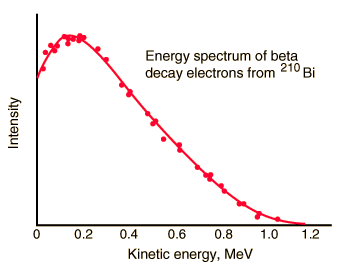kmarc, thanks for your generous comments. I share your appreciation about how much there is to wonder about the universe, which is why I ended up embarking on this path myself. It is indeed a pity that both of us will never be able to live long enough to see more wonderful discoveries, but we do our best in the time we're given.
The reason for this extremely late post is for me to post an example that I couldn't recall at the time of our discussion, but which suddenly hit me, where an experimental discovery could've implied something radically different that would've shaken, if not smash the foundations of physics, but the physicists knew better and posited another possibility instead, and I'd like to draw parallels with the FTL discussion we had to just highlight how 'strong' the foundations are:
It pertains to the discovery of the neutrino. When experiments measuring beta decay were started, say of tritium (likely not the substance they used), a startling discovery was made. You could measure the mass of the initial and final nuclei, and we knew the mass of the electron to quite some precision at the time. Since the mass of the nuclei >> mass of the electron, it was safe to expect that the kinetic energy of the electron to be very high, and measurements were made of it. By conservation of mass-energy, the expectation was that since we knew the initial and final masses of the particles, we'd easily be able to calculate the kinetic energy of the electron, and measurements of the kinetic energy would clump around this calculated value (looking something like a shifted delta function, something like this: __|__, with the peak at the calculated value of the expected KE). Except that they saw this instead:

That was strange, because what you had was conservation of momentum being violated. You could have gone on to interpret this as conservation of momentum being wrong, but what the physicists did was to suggest that there was another particle carrying away the extra energy and momentum - the neutrino. Remember, the neutrino is extremely hard to find, and indeed, it took another 2.5 decades before an experimental verification was even achieved.
All I'm saying is there are sound reasons for today's theories, and while they're incomplete (and possibly always will be), it doesn't mean that the foundations are automatically wrong and need overhaul, because they have managed to describe a large set of observations we've carried out so far, and any new set of foundations will always need to be able to replicate this success, and then build even more upon them.


 Feb 18 2010, 07:10 PM
Feb 18 2010, 07:10 PM
 Quote
Quote

 0.0148sec
0.0148sec
 0.43
0.43
 5 queries
5 queries
 GZIP Disabled
GZIP Disabled